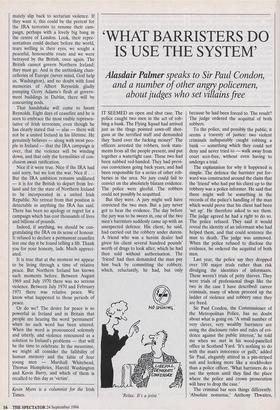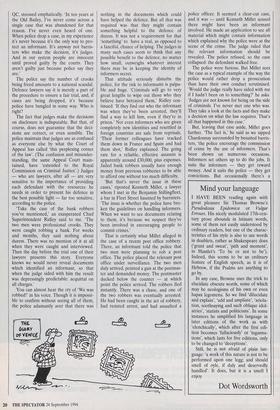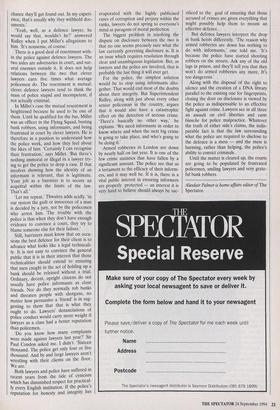`WHAT BARRISTERS DO IS USE THE SYSTEM'
Alasdair Palmer speaks to Sir Paul Condon,
and a number of other angry policemen, about judges who set villains free
IT SEEMED an open and shut case. The police caught two men in the act of rob- bing a bank. The Flying Squad had arrived just as the thugs pointed sawn-off shot- guns at the terrified staff and demanded they 'hand over the fucking money!' The officers arrested the robbers, took state- ments from all the people present, and put together a watertight case. These two had been nabbed red-handed. They had previ- ous convictions going back years, and had been responsible for a series of other rob- beries in the area. No jury could fail to convict on the absolutely blatant evidence. The police were gleeful. The robbers could not possibly be acquitted.
But they were. A jury might well have convicted the two men. But a jury never got to hear the evidence. The day before the jury was to be sworn in, one of the two men's banisters suddenly came up with an unexpected defence. His client, he said, had carried out the robbery under duress. A friend who was a heroin dealer had given his client several hundred pounds' worth of drugs to look after, which he had then sold without authorisation. The `friend' had then demanded the man pay him back by committing the robbery, which, reluctantly, he had, but only `Relax. It's a joint.' because he had been forced to. The result? The judge ordered the acquittal of both robbers.
To the police, and possibly the public, it seems a travesty of justice: two violent criminals indisputably caught robbing a bank — something which they could not deny and never tried to — walk away from court scot-free, without even having to undergo a trial.
The explanation for why it happened is simple. The defence the barrister put for- ward was constructed around the claim that the 'friend' who had put his client up to the robbery was a police informer. He said that there might well be something in the records of the police's handling of the man which would prove that his client had been `set up'. He therefore asked to see them. The judge agreed he had a right to do so. The police refused. They said it would reveal the identity of an informant who had helped them, and that could sentence the man to death. The judge was unmoved. When the police refused to disclose the evidence, he ordered the acquittal of both men.
Last year, the police say they dropped over 100 major trials rather than risk divulging the identities of informants. These weren't trials of petty thieves. They were trials of professional thugs like the two in the case I have described: career criminals, many of whom proceed up the ladder of violence and robbery once they are freed.
Sir Paul Condon, the Commissioner of the Metropolitan Police, has no doubt about what is going on, 'A small number of very clever, very wealthy banisters are using the disclosure rules and rules of evi- dence against the public interest,' he told me when we met in his wood-panelled office in Scotland Yard. 'It's nothing to do with the man's innocence or guilt,' added Sir Paul, elegantly attired in a pin-striped suit and looking more like a stockbroker than a police officer. 'What barristers do is use the system until they find the place where the police and crown prosecution will have to drop the case.'
The criminal bar sees things differently. `Absolute nonsense,' Anthony Thwaites, QC, stressed emphatically. 'In ten years at the Old Bailey, I've never come across a single case that was abandoned for that reason. I've never even heard of one. When police drop a case, in my experience it's never because it's the only way to pro- tect an informant. It's anyway not barris- ters who make the decision, it's judges. And in our system people are innocent until proved guilty by the courts. They aren't guilty just because police say they are.'
The police say the number of crooks being freed amounts to a national scandal. Defence lawyers say it is merely a part of the procedure to ensure a fair trial, and, if cases are being dropped, it's because police have bungled in some way. Who is right?
The fact that judges make the decisions on disclosure is indisputable. But that, of course, does not guarantee that the deci- sions are correct, or even sensible. The police maintain that judges are as confused as everyone else by what the Court of Appeal has called 'this perplexing corner of the law'. (The confusion and misunder- standing, the same Appeal Court main- tained, have 'extended to the Royal Commission on Criminal Justice'.) Judges — who are lawyers, after all — are very sensitive to the importance of providing each defendant with the resources he needs in order to present his defence in the best possible light — far too sensitive, according to the police.
`Take the case of the bank robbers you've mentioned,' an exasperated Chief Superintendent Ridley said to me. 'The two men were professional crooks. They were caught robbing a bank. For weeks and months, they said nothing about duress. There was no mention of it at all when they were caught and interviewed. Then the day before the trial one of their lawyers presents this story. Everyone knows we would never reveal documents which identified an informant, so that when the judge sided with him the result was depressingly predictable: acquittal on all charges.'
You can almost hear the cry of 'We was robbed!' in his voice. Though it is impossi- ble to confirm without seeing all of them, the police adamantly aver that there was nothing in the documents which could have helped the defence. But all that was required was that they might contain something helpful to the defence of duress. It was not a requirement for that `something' to have a real, as opposed to a fanciful, chance of helping. The judges in many such cases seem to think that any possible benefit to the defence, no matter how small, outweighs whatever interest there may be in keeping the identity of informers secret.
That attitude seriously disturbs the police, for the risk to informants is palpa- ble and huge. 'Criminals will go to very great lengths to wipe out those who they believe have betrayed them,' Ridley con- tinued. 'If they find out who the informant was when they've been arrested, they'll find a way to kill him, even if they're in prison.' Not even informers who are given completely new identities and resettled in foreign countries are safe from reprisals. `Their former colleagues have tracked them down in France and Spain and had them shot,' Ridley explained. The going rate for a reliable, effective assassin is apparently around £30,000, plus expenses. Jailed bank robbers usually have enough money from previous robberies to be able to afford one without too much difficulty.
`But that's never the issue in these cases,' riposted Kenneth Millet, a lawyer whom I met in the Benjamin Stillingfleet, a bar in Fleet Street haunted by barristers. `The issue is whether the police have bro- ken the guidelines on handling informers. When we want to see documents relating to them, it's because we suspect they've been involved in encouraging people to commit crimes.'
That is certainly what Millet alleged in the case of a recent post office robbery. There, an informant told the police that two men were planning to rob a post office. The police placed the relevant post office under surveillance. The two men duly arrived, pointed a gun at the postmas- ter and demanded money. The postmaster ducked below the counter — at which point the police arrived. The robbers fled instantly. There was a chase, and one of the two robbers was eventually arrested. He had been caught in the act of robbery, had resisted arrest, and had assaulted a police officer. It seemed a clear-cut case, and it was — until Kenneth Millet sensed there might have been an informant involved. He made an application to see all material which might contain information which explained why the police were at the scene of the crime. The judge ruled that the relevant information should be revealed. The police refused, so the case collapsed: the defendant walked free.
The police were furious. But Millet sees the case as a typical example of the way the police would rather drop a prosecution than have their own conduct scrutinised. `Would the judge really have sided with me if I hadn't been on to something?' he asks. `Judges are not known for being on the side of criminals. I've never met one who was. They take a look at the facts and they make a decision on what the law requires. That's all that happened in this case.'
But, leaving that case aside, Millet goes further. 'The fact is,' he said as we sipped Chardonnay surrounded by besuited barris- ters, 'the police encourage the commission of crime by the use of informers. That's been shown on numerous occasions. Informers set others up to do the jobs. It suits the informers — they get reward money. And it suits the police — they get convictions. But occasionally there's a chance they'll get found out. In my experi- ence, that's usually why they withhold doc- uments.'
'Yeah, well, as a defence lawyer, he would say that, wouldn't he?' answered Ridley when I put Millet's allegations to him. 'It's nonsense, of course.'
There is a good deal of resentment with- in the police against defence lawyers. The two sides are adversaries in court, and nat- ural enemies outside it. It does not help relations between the two that clever lawyers earn five times what average policemen do. The resentment is mutual: clever defence lawyers tend to think the mass of police stupid and incompetent, if not actually criminal.
In Millet's case the mutual resentment is heightened because he used to be one of them. Until he qualified for the bar, Millet was an officer in the Flying Squad, busting bank robbers, using informants, and being frustrated in court by clever lawyers. He is therefore in a position to understand how the police work, and how they feel about the likes of him. 'Certainly I can recognise their frustration,' says Millet. 'But there's nothing immoral or illegal in a lawyer try- ing to get the police to drop a case. If that involves showing how the identity of an informant is relevant, that is legitimate. Your job as a barrister is to secure an acquittal within the limits of the law. That's all.'
'Let me repeat,' Thwaites adds acidly, 'in our system the guilt or innocence of a man is decided by a jury, not by the policemen who arrest him. The trouble with the police is that when they don't have enough evidence to convince a court, they try to blame someone else for their failure.'
Still, barristers must know that on occa- sions the best defence for their client is to advance what looks like a legal technicali- ty. It is not easy to convince the general public that it is in their interest that those technicalities should extend to ensuring that men caught in the act of holding up a bank should be released without a trial. Ordinary, decent, upright citizens do not usually have police informants as close friends. Nor do they normally rob banks and threaten people with shotguns, no matter how persuasive a 'friend' is in sug- gesting to them that that is what they ought to do. Lawyers' denunciations of police conduct would carry more weight if lawyers as a class had a better reputation than policemen. `Do you know how many complaints were made against lawyers last year?' Sir Paul Condon asked me. I didn't. 'Sixteen thousand. The police get only four or five thousand. And by and large lawyers aren't wrestling with their clients on the floor. We are.'
Both lawyers and police have suffered in recent years from the tide of cynicism which has diminished respect for practical- ly every English institution. If the police's reputation for honesty and integrity has evaporated with the highly publicised cases of corruption and perjury within the ranks, lawyers do not spring to everyone's mind as paragons of moral perfection.
The biggest problem in resolving the dispute on disclosure between the two is that no one seems precisely sure what the law currently governing disclosure is. It is an issue which requires resolution through clear and unambiguous legislation. But, as lawyers and the police are involved, that is probably the last thing it will ever get. For the police, the simplest solution would be to stop using informants alto- gether. That would end most of the doubts about their integrity. But Superintendent Ridley, along with just about every other senior policeman in the country, argues that it would also have a catastrophic effect on the detection of serious crime. 'There's basically no other way,' he explains. 'We need informants in order to know where and when the next big crime is going to take place, and who's going to be doing it.'
Armed robberies in London are down by nearly half on last year. It is one of the few crime statistics that have fallen by a significant amount. The police see that as a testament to the efficacy of their inform- ers, and it may well be. If it is, there is a vital public interest in ensuring informers are properly protected — an interest it is very hard to believe should always be sac- rificed to the goal of ensuring that those accused of crimes are given everything that might possibly help them to mount an effective defence.
But defence lawyers interpret the drop in bank heists differently. 'The reason why armed robberies are down has nothing to do with informants,' one told me. 'It's because the police have started shooting robbers on the streets. Ask any of the old lags in prison, and they'll tell you that they won't do armed robberies any more. It's too dangerous.'
Along with the disposal of the right to silence and the creation of a DNA library parallel to the existing one for fingerprints, closing the door on disclosure is viewed by the police as indispensable to an effective fight against crime. Lawyers see in all three an assault on civil liberties and carte blanche for police malpractice. Whatever the truth of either side's claims, the indis- putable fact is that the law surrounding what the police are required to disclose to the defence is a mess — and the mess is harming, rather than helping, the police's ability to convict criminals.
Until the matter is cleared up, the courts are going to be populated by frustrated policemen, smiling lawyers and very grate- ful bank robbers.
Alasdair Palmer is home affairs editor of The Spectator.




































































 Previous page
Previous page